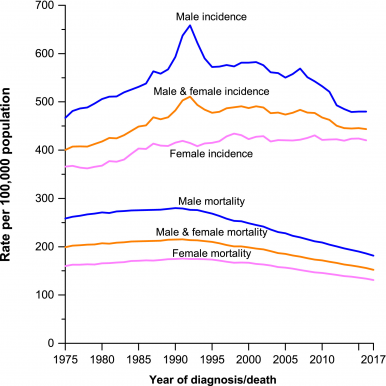Happy New Year to our User Community and our Library Blog Readers. I’d like to spend some time reflecting on last year’s accomplishments and research support provided by library staff by sharing some key library metrics and updates we track. Our physical space had over 110,700 in-person visits, which was an increase of over 7,000 visits in 2018. Our website saw an increase of close to 600 virtual visits going from 41,768 (2018) to 42,355 (2019).
Most impressive was usage of the electronic journal collection by MSK staff. In 2019, we recorded 1,922,211 downloads of full text articles and this count doesn’t include December usage. In comparison, in 2018, 1,920,937 journal articles were downloaded showing an increase of 1,274. However, if you take the average downloads per month to account for the missing usage for December 2019, this brings the increase for 2019 to about 176,020. Now that’s a metric!
As for research requests, the Research Informationist team received 916 emails and while this number was slightly higher in 2018 (924), the amount of time devoted to conducting, interpreting, and sending on-target results increased by over 44 hours in 2019 (1,636 hours in 2019). These client interactions do not include requests we receive via Ask-a-Librarian, chat, phone, or in-person conversations.
While we maintain a very focused journal collection, we enhance this collection by obtaining journal articles and other content (books, book chapters, dissertations, etc.) via Document Delivery Services (DDS). Our client requests for content outside our collection went down slightly in 2019. The DDS team filled 12,874 requests in 2019 and 13,001 in 2018. Most individuals don’t like to see a metric decrease, but in this case, we can attribute the lower number to our users leveraging the current collection and what they can access instantly!
We also achieved our defined 2019 goals. Synapse now includes a Research Activity Dashboard for both groups and individuals. We finished the 2018 Synapse Publications report and managed to ingest four years of retrospective content! ILLiad (Document Delivery) was upgraded and we implemented client feedback from usability testing to improve ONESEARCH, our search and discovery tool located on the library website. ONESEARCH enables users to search multiple MSK collections through a single search box.
We were able to get our beta version of the MSK Data Catalog up and running and look forward to launching this resource in 1Q2020. And finally, we started work on our client and metric tracking system which we also hope to launch in 2020. This system will improve how the library staff handles all our client requests.
As we do every year, in 2020 we will continue to focus on the day-to-day operations of the MSK Library and on our commitment to engage our user community to better understand their information needs. We look forward to hearing from you. Better yet, we look forward to partnering with you to see how we can integrate library resources and services in your day-to-day workflows!
For any questions regarding our collections or services, don’t hesitate to ASK US.
Donna Gibson
Director of Library Services
